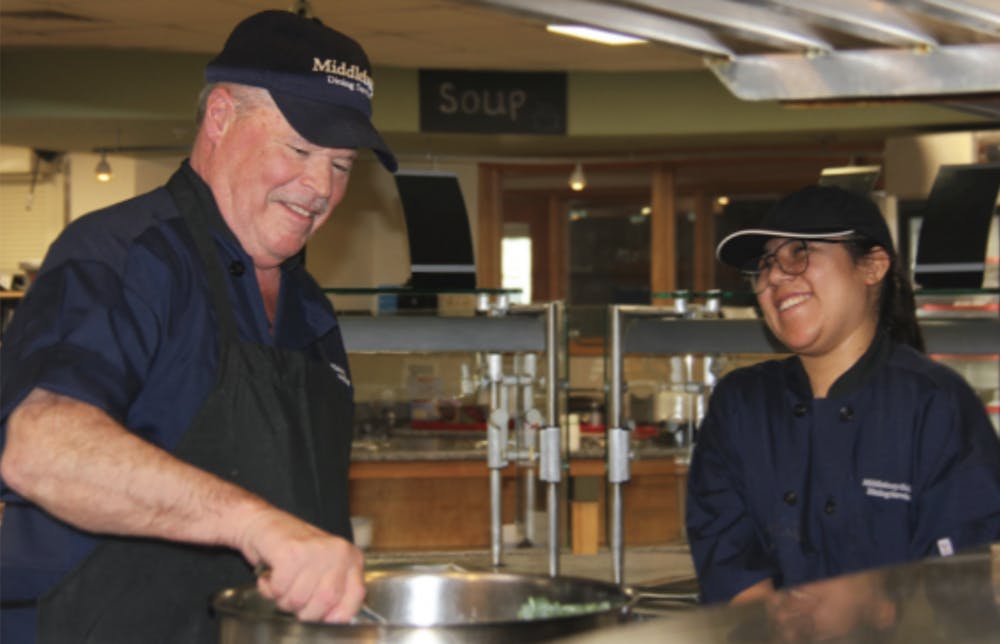Days when the usual dishes are replaced with paper plates and utensils in Ross Dining Hall are a sign that the dishroom is overwhelmed, and when the pizza station is shut down, it is a sign that the cooks are occupied at other stations. Students lining up for food can easily spot the understaffing that affects the dining hall’s workflow.
While staffing at Middlebury has improved since the pandemic, some areas of campus still struggle with short staffing. The dining halls and Davis Library are two places where understaffing is still taking a toll.
Some of the burdens of understaffing are visible to the public eye, but others can only be felt by staff members themselves. In the dining hall, jobs that are located in the back, unseen by students passing through, are some of the most impacted positions.
Dan Detora, executive director of food service operations, described the ways in which dining services are coping with staffing issues.
“At times we have had as many as 17 open positions. It has resulted in employees working overtime, long work weeks and just being overworked daily.” Detora wrote in an email to The Campus. “Fortunately, we are now seeing more applicants and currently only have a few open positions.”
A full-time employee at Ross Dining Hall who wished to remain anonymous spoke to The Campus about how the loss of necessary employees has greatly affected their job hours.
“We just lost a full-timer, so it’s been difficult,” the employee said, noting that they work between four to four-and-a-half hours of overtime each week. “I’m supposed to get done at 9:30 p.m., but many times I only get out of here at 10:00 or 10:30.”
Detora added that to tackle some of these issues from the fall, the team decided to adjust Ross Dining Hall’s menu and hours of service, which Detora said helped alleviate some challenges for staff.
“We changed in J-Term because we were having difficulties with equipment and getting our employees proper breaks,” Detora explained.
In Davis Family Library, four librarians left their jobs in a four month period last spring, leaving the library low on staff members. Staff turnover is still an ongoing issue at Davis, according to Terry Simpkins, director of discovery and access services and the representative for the library on Staff Council.
“We have a couple of imminent retirements coming… and by the time we fill those positions and the newest folks start working here, we will have turned over about 1/3 of our entire library staff,” Simpkins wrote in an email to The Campus.
This flurry of change comes after many years of relative staffing stability in the library. The recent turnover is largely tied to budget cuts and the implementation of the ‘skill matrix’ staff compensation system in July 2022, about which staff members have mixed feelings, Simpkins said.
“Librarians who left and remained in academic librarianship easily found better paying jobs within the New England region. Even those staff who changed careers — and two of our former librarians left both academia and libraries entirely — told me directly prior to their leaving that the college’s seemingly forever-austerity-mode regarding budgets simply wore them out,” Simpkins wrote.
Although the dining hall is better staffed than it has been previously, according to Detora, a clashing of schedules still leads to some challenges during certain times of day.
“In fact, there is often overstaffing on mid-week evening shifts, when students are most willing to work,” wrote Chris Frago ’24, a part-time student cook at Ross in an email to The Campus. “Yet, on Saturday night, when Atwater is closed and Ross is busiest, few, if any, student workers will take the shift.”
Frago added that the all-day, pub food model introduced last fall created new challenges for dining hall employees.
“Staying open all day uninterrupted took the chefs’ precious attention away from prep work, which is the foundation of every great meal at Ross,” Frago wrote. “Having even an hour to reset and cook rather than serve food makes all the difference, and lets chefs create bolder and better meals.”
Ross changed its hours and moved away from continuous dining at the beginning of J-Term in order to remedy some of the issues caused by serving food all day.
Even amid some improvements from the recent change in hours, dining hall employees stressed the importance of expanding the number of roles in the dining halls and hiring more employees, explaining that student rush times can sometimes overwhelm even a full shift of workers.
A dining room attendant at Ross who asked to remain anonymous spoke about the ways these issues can lead to staff turnover.
“We only have one or two people at a station that requires like four people, like the dishroom for example. So, those people get overloaded with work and they get frustrated, so they leave,” the employee said. “I think if we just had more open positions available, you’re then not relying on a few people to do a job that requires more people.”
The dining attendant also expressed frustration that the responsibilities of dining workers have grown with the return of 10 o’clock Ross, despite not having received any new staff members to work the extended hours.
While understaffing is the cause of many of these issues, student behavior has also frustrated several dining hall employees. Dining Services receives a garbage bag full of dishes every week from facilities that students have thrown away in trash cans. These dishes must be sorted from the trash by facilities and subsequently washed by dining hall employees, according to one anonymous source who works in the dining halls.
Detora added that the difficulty of finding housing in Addison County results in a smaller applicant pool. Staff members in Dining Services agreed, citing their personal experiences with finding affordable places to live in the local area.
“I still live at home with my mom, and I’ve looked around for apartments… it’s just not affordable,” the dining hall attendant said.
Simpkins wrote that library staff frustrations around wages and the college’s budgeting has led to more staff turnover. A reference librarian position was removed entirely without prior notice during the early months of the Covid-19 pandemic, according to Simpkins. Additionally, he said the college’s collections budget has not kept pace with inflation, leading to staff dissatisfaction.
While the budget cuts alone frustrated some staff enough to leave the college, the hard cap on salaries in the skill matrix compensation system also led to staff dissatisfaction in the library in particular, according to Simpkins.
“I have personally witnessed how it saps morale like crazy and how it effectively penalizes current long-serving staff… it also undermines the new system of skill matrix promotions and annual market reviews by nullifying what should be a substantial salary increase,” Simpkins wrote. “It's frankly a terrible feature of the current compensation system, especially when it affects staff in lower graded positions.”
Tim Parsons, the college’s landscape horticulturist, also discussed the compensation system and the lack of salary adjustments for cost-of-living increases in the area. Adjustments to staff salary pay grades are given according to market research on salaries at peer institutions based on an aggregate of factors, including cost-of-living, but there is no specific cost-of-living increase to wages.
Wages for staff have not kept pace with inflation since the Covid-19 pandemic, according to the Middlebury Chapter of the American Association of University Professors (AAUP). The current minimum wage at the college is $17.60 per hour, while a livable wage for a single adult with no children in Addison County is $23.33 per hour, according to the MIT Living Wage Calculator.
“Are we always going to be playing catchup?” Parsons asked.
Frago wrote optimistically about his experience working in the kitchen this year and stressed the importance of the student body understanding the staff’s perspective.
“Many employees were once in college themselves, and have experienced dining as a student. They know that not everyone will like everything at each meal, but they take pride in their work and do far more than they are given credit for,” Frago said.
Simpkins stressed the work staff members do to keep the college functioning every day, forced to pick up extra slack when departments are understaffed. “Staff keep this place running, and it feels like we bear most of the burden for balancing the budget,” Simpkins wrote.

Tejas Srinivasan '24 (he/him) is an Editor at Large.
Originally from Cincinnati, Ohio, Tejas previously served as an opinion editor. He spent his junior year in London at King’s College. Outside of The Campus, he also hosts a podcast called Cultural Mixtapes which he started in the summer of 2022. Tejas is an English Major, on the literature track, with a music minor.




